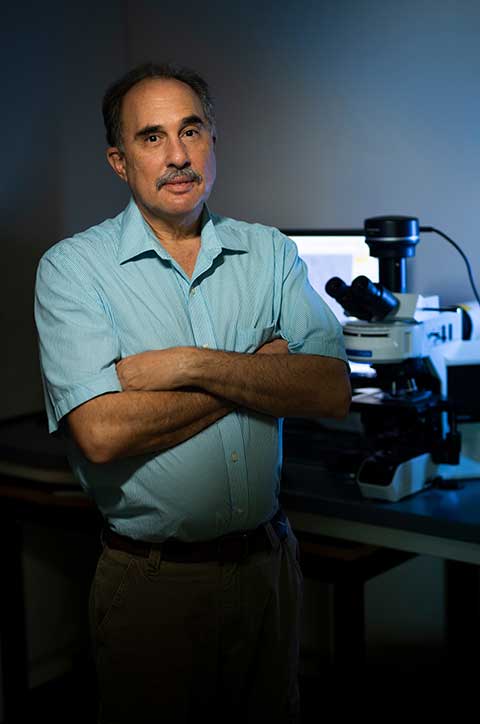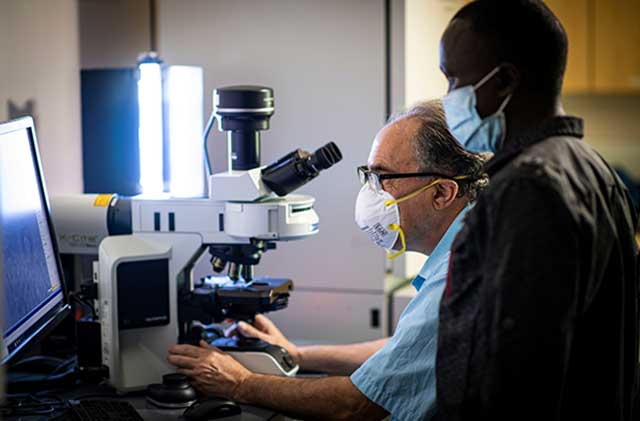Southwest Florida has experienced algal blooms at their worst. But the blue-green algae that plagued canals and rivers in 2018 is not limited to our region. Harmful algal blooms can be found in various forms nationwide. It’s a phenomena Dr. Barry Rosen of The Water School at Florida Gulf Coast University takes very seriously. A professor in the Department of Ecology & Environmental Studies, Rosen aims to keep communities healthy, even when they are located thousands of miles away from his lab.
“The goal is for people to understand what is in their water and if they should be concerned,” he said.

This summer, a dog died in Utah’s Zion National Park while swimming the Virgin River. Researchers called on the expertise of Rosen to figure out why. Water samples from the river were overnighted some 2,300 miles to Southwest Florida. Within minutes of receiving them, Rosen cracked open the coolers and went to work.
“They measured the toxin and it was off the charts,” said Rosen, “It’s exposure to those toxins we have to worry about, either from the drinking water or from humans or animals accidentally consuming the water.”
A benthic community of cyanobacteria, or bacteria living in the river bottom, was discovered in the Virgin River. It’s the opposite of the green gunk we see in Southwest Florida; it’s brown and lives on the bottom but still produces toxins. Through a culturing process Rosen discovered it can float, a potential reason for the pup’s death.
The Virgin River is an important resource for people living in the area because it is used for drinking water, irrigation and recreation. Finding answers about these organisms is not only important now, but Rosen says it is critical to have this information for the future.
“They are thrilled they can send in samples and have a national expert tell them what is in their water,” explained Rosen. “It’s a big deal. In the future, if this organism is found and we know its toxin profile, they can let the drinking facilities know this species is blooming, and in the past it was a toxin producer.”
Rosen is also receiving samples from Oregon. The Eugene Water and Electric Board looked to Rosen for answers about its own drinking water supply and what might be lurking in the water.
“They get the most unusual organisms blooming that we don’t see on this coast very often,” said Rosen. “Just this week, I looked back at some of the cultures I had started from April or May. Sure enough, I have one of main bloomers throughout Oregon. I have it alone.”
The research isn’t stopping out west. Rosen says he is analyzing samples from California, Washington, Colorado and New Jersey. He’s fulfilling The Water School’s mission by taking lessons learned here in Florida and applying them throughout the state, nation and world.

“I do extremely applied work,” said Rosen. “I personally love the beauty of the organism, and unraveling the mysteries of them, but if it isn’t applied then who cares?”
As its physical home is currently under construction on FGCU’s campus, The Water School has been tracking real-world problems for years. Rosen’s work is only one example of how the school’s influence is far-reaching, which is something President Martin predicted in 2019.
“We want to serve the region at such a high level and with such expertise, that one day in the not so distant future, wherever there is a water issue around the planet, the first thing people will say is let’s call Florida Gulf Coast University. They know what to do,” said FGCU President Mike Martin at the announcement of The Water School on March 22, 2019. “We are doing this not only to serve here, but to serve well beyond the boundaries that we count as our service area and demonstrate to the world what can happen in a place like this as we solve real problems.”
The goal is to tackle water issues now that will help prevent problems in the future and protect the health of communities. Rosen is compiling his research to make a cyanobacteria key, so people can identify organisms by photographs, rather than drawings.
“It’s a way to confirm what that organism is,” said Rosen. “We are coming up with more and more safety criteria, but that could all stem from organisms and what toxins they could be making.”
- Learn more about The Water School
